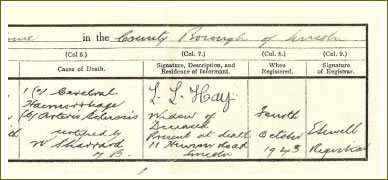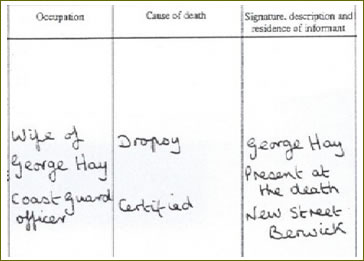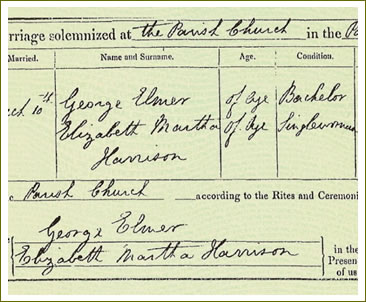Difference between revisions of "Scanned and Handwritten Certificates Guide"
(New page: ==Scanned Certificates== '''So what is a scanned certificate?''' Basically a scanned certificate is a copy of the original register entry, it will be the nearest thing to having the ori...) |
m |
||
| (47 intermediate revisions by 3 users not shown) | |||
| Line 1: | Line 1: | ||
| + | [[Category:Certificates]] | ||
==Scanned Certificates== | ==Scanned Certificates== | ||
'''So what is a scanned certificate?''' | '''So what is a scanned certificate?''' | ||
| + | [[image:Signed.jpg|right|400px]] | ||
| + | Basically a scanned certificate is a copy of the original register entry, it will be the nearest thing to having the original certificate in your collection and shows the signature or mark of your ancestors. | ||
| + | |||
| + | The telltale sign of a scanned certificate is the signatures, they are in different handwriting to the rest of the entries on the certificate.<br> | ||
| + | |||
| + | '''Example Illustration'''<br> | ||
| + | The extract from a death certificate illustrated shows a rather shaky signature made by the informant, something that you won't find on a General Register Office issued certificate. | ||
| + | <br><br> | ||
| + | |||
| + | |||
| + | |||
| − | |||
| − | |||
| − | |||
| − | |||
| − | |||
==Handwritten/typed certificates== | ==Handwritten/typed certificates== | ||
| − | ''' | + | [[image:death_hand.jpg|right|400px]] |
| − | So what about handwritten/typed certificates?''' | + | '''So what about handwritten/typed certificates?''' |
Handwritten certificates are certificates issued by a local office, a blank certificate is written out by the staff working there now, it contains the relevant information but will have modern handwriting. Some very diligent offices employ the services of someone with neat writing and skills to write in an old style, nonetheless the certificate contains the all important information you want whatever style is used. | Handwritten certificates are certificates issued by a local office, a blank certificate is written out by the staff working there now, it contains the relevant information but will have modern handwriting. Some very diligent offices employ the services of someone with neat writing and skills to write in an old style, nonetheless the certificate contains the all important information you want whatever style is used. | ||
| − | A typed certificate is fairly self explanatory, again a blank certificate is completed after you place the order. The details are typed onto the blank, they are very easy to read,no struggling to make out the letters that you may experience with a handwritten certificate, but they have a very "sterile" feel to them. | + | A typed certificate is fairly self explanatory, again a blank certificate is completed after you place the order. The details are typed onto the blank, they are very easy to read, no struggling to make out the letters that you may experience with a handwritten certificate, but they have a very "sterile" feel to them. |
| − | Great for information and ease of use, but not so good for the authentic feel. | + | Great for information and ease of use, but not so good for the authentic feel.<br> |
| + | |||
| + | |||
| + | |||
| + | '''Example Illustration'''<br> | ||
| + | The extract from the handwritten certificate clearly shows that the certificate has been completed by just one person, if you examine the name of George Hay in the columns you will see that both the "signature" and the "non signature" entries for the name are written by the same hand, and as such you are not looking at his signature. | ||
| + | <br><br> | ||
| − | |||
| − | |||
==General Register Office (GRO) Certificates == | ==General Register Office (GRO) Certificates == | ||
| + | [[image:marrcert.jpg|right|400px]] | ||
'''But aren't GRO certificates "original" documents?''' | '''But aren't GRO certificates "original" documents?''' | ||
| − | Most of you will doubtless have ordered a few GRO certificates, they are supplied from GRO held records but are NOT the original documents that your ancestors would have signed. | + | Most of you will doubtless have ordered a few GRO certificates, they are supplied from GRO held records but are NOT the original documents that your ancestors would have signed. Only the local registrars have access to the original documents. |
| − | If you look at any signatures on a GRO cert they are in reality a "forgery", the whole certificate was completed by one person from an index sheet supplied by the local registrar | + | |
| − | + | If you look at any signatures on a GRO cert they are in reality a "forgery", the whole certificate was completed by one person from an index sheet supplied by the local registrar. <br> | |
| + | |||
| + | '''Example Illustration'''<br> | ||
| + | The extract from a marriage certificate clearly shows the names of the happy couple are in identical writing to the "signatures", a sure sign the certificate could not be a scan of the original register. | ||
| + | |||
| + | |||
| + | :Back to [[Main Page]] | ||
| + | :Back to [[All About Certificates]] | ||
Latest revision as of 07:10, 22 April 2008
Scanned Certificates
So what is a scanned certificate?
Basically a scanned certificate is a copy of the original register entry, it will be the nearest thing to having the original certificate in your collection and shows the signature or mark of your ancestors.
The telltale sign of a scanned certificate is the signatures, they are in different handwriting to the rest of the entries on the certificate.
Example Illustration
The extract from a death certificate illustrated shows a rather shaky signature made by the informant, something that you won't find on a General Register Office issued certificate.
Handwritten/typed certificates
So what about handwritten/typed certificates?
Handwritten certificates are certificates issued by a local office, a blank certificate is written out by the staff working there now, it contains the relevant information but will have modern handwriting. Some very diligent offices employ the services of someone with neat writing and skills to write in an old style, nonetheless the certificate contains the all important information you want whatever style is used.
A typed certificate is fairly self explanatory, again a blank certificate is completed after you place the order. The details are typed onto the blank, they are very easy to read, no struggling to make out the letters that you may experience with a handwritten certificate, but they have a very "sterile" feel to them.
Great for information and ease of use, but not so good for the authentic feel.
Example Illustration
The extract from the handwritten certificate clearly shows that the certificate has been completed by just one person, if you examine the name of George Hay in the columns you will see that both the "signature" and the "non signature" entries for the name are written by the same hand, and as such you are not looking at his signature.
General Register Office (GRO) Certificates
But aren't GRO certificates "original" documents?
Most of you will doubtless have ordered a few GRO certificates, they are supplied from GRO held records but are NOT the original documents that your ancestors would have signed. Only the local registrars have access to the original documents.
If you look at any signatures on a GRO cert they are in reality a "forgery", the whole certificate was completed by one person from an index sheet supplied by the local registrar.
Example Illustration
The extract from a marriage certificate clearly shows the names of the happy couple are in identical writing to the "signatures", a sure sign the certificate could not be a scan of the original register.
- Back to Main Page
- Back to All About Certificates


